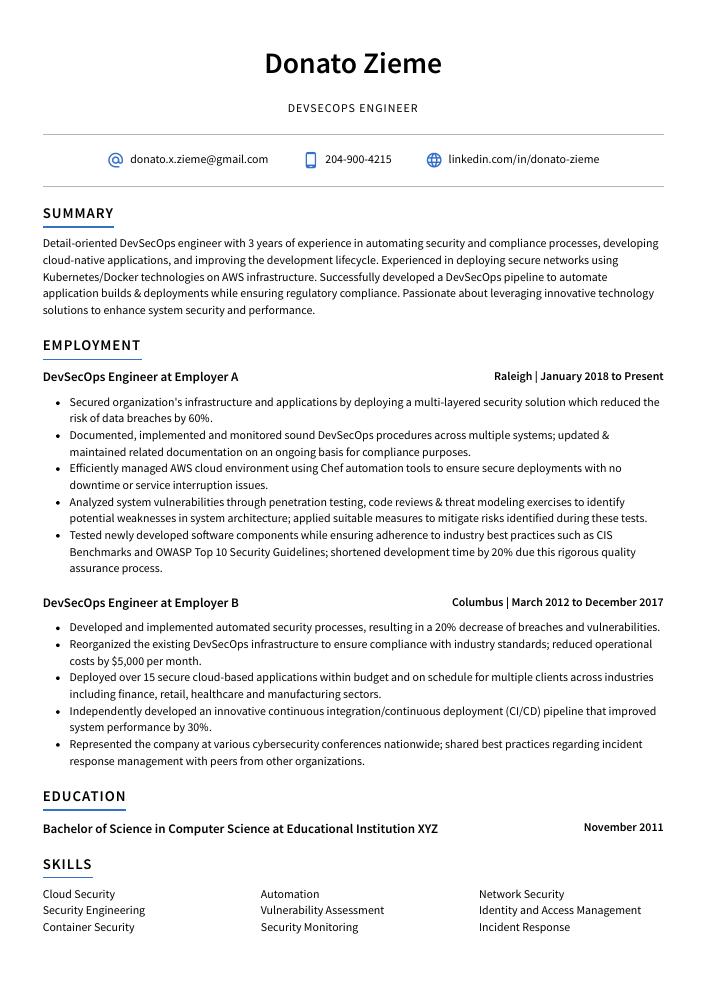DevSecOps Engineer Resume Guide
DevSecOps Engineers are responsible for integrating security into the development process of software, ensuring that applications and systems remain secure throughout their lifecycle. They work to automate processes in order to detect vulnerabilities quickly and efficiently, as well as coordinate with other departments within an organization on matters related to system security.
You have the experience and know-how to be a top DevSecOps engineer, but employers don’t know about your capabilities. To make them aware of your expertise, you need to write an impressive resume that will catch their eye.
This guide will walk you through the entire process of creating a top-notch resume. We first show you a complete example and then break down what each resume section should look like.
Table of Contents
The guide is divided into sections for your convenience. You can read it from beginning to end or use the table of contents below to jump to a specific part.
DevSecOps Engineer Resume Sample
Donato Zieme
DevSecOps Engineer
[email protected]
204-900-4215
linkedin.com/in/donato-zieme
Summary
Detail-oriented DevSecOps engineer with 3 years of experience in automating security and compliance processes, developing cloud-native applications, and improving the development lifecycle. Experienced in deploying secure networks using Kubernetes/Docker technologies on AWS infrastructure. Successfully developed a DevSecOps pipeline to automate application builds & deployments while ensuring regulatory compliance. Passionate about leveraging innovative technology solutions to enhance system security and performance.
Experience
DevSecOps Engineer, Employer A
Raleigh, Jan 2018 – Present
- Secured organization’s infrastructure and applications by deploying a multi-layered security solution which reduced the risk of data breaches by 60%.
- Documented, implemented and monitored sound DevSecOps procedures across multiple systems; updated & maintained related documentation on an ongoing basis for compliance purposes.
- Efficiently managed AWS cloud environment using Chef automation tools to ensure secure deployments with no downtime or service interruption issues.
- Analyzed system vulnerabilities through penetration testing, code reviews & threat modeling exercises to identify potential weaknesses in system architecture; applied suitable measures to mitigate risks identified during these tests.
- Tested newly developed software components while ensuring adherence to industry best practices such as CIS Benchmarks and OWASP Top 10 Security Guidelines; shortened development time by 20% due this rigorous quality assurance process.
DevSecOps Engineer, Employer B
Columbus, Mar 2012 – Dec 2017
- Developed and implemented automated security processes, resulting in a 20% decrease of breaches and vulnerabilities.
- Reorganized the existing DevSecOps infrastructure to ensure compliance with industry standards; reduced operational costs by $5,000 per month.
- Deployed over 15 secure cloud-based applications within budget and on schedule for multiple clients across industries including finance, retail, healthcare and manufacturing sectors.
- Independently developed an innovative continuous integration/continuous deployment (CI/CD) pipeline that improved system performance by 30%.
- Represented the company at various cybersecurity conferences nationwide; shared best practices regarding incident response management with peers from other organizations.
Skills
- Cloud Security
- Automation
- Network Security
- Security Engineering
- Vulnerability Assessment
- Identity and Access Management
- Container Security
- Security Monitoring
- Incident Response
Education
Bachelor of Science in Computer Science
Educational Institution XYZ
Nov 2011
Certifications
Certified DevSecOps Engineer
DevOps Institute
May 2017
1. Summary / Objective
A resume summary for a DevSecOps engineer should provide the hiring manager with an overview of your experience and skills. Include details such as how many years you have been in the field, what certifications you hold, any security-related projects you have worked on, and which tools/technologies are most familiar to you. Additionally, highlight any successes or accomplishments that demonstrate your ability to work effectively within this role.
Below are some resume summary examples:
Accomplished DevSecOps engineer with 8+ years of experience in building and managing secure cloud-based systems. Skilled at leveraging automation to create efficient, reliable development pipelines that ensure compliance with security best practices. Seeking to bring expertise in setting up effective monitoring processes and incident response plans to ABC Tech. Key achievements include streamlining the deployment process by 30%, resulting in a 20% reduction of critical vulnerabilities across networks.
Energetic DevSecOps engineer with 5+ years of hands-on experience creating and deploying secure software systems. Skilled in developing automated pipelines for fast, reliable deployments while ensuring proper security protocols are followed. Proven track record of successfully integrating DevOps best practices into development processes resulting in a 20% reduction in release timeframes. Seeking to join ABC Tech’s innovative team to ensure the safety and reliability of their products.
Proficient DevSecOps engineer with a decade of experience in developing, deploying and managing secure applications. Proven track record of success in leveraging cloud-native technologies to build fault tolerant systems for mission critical workloads. Adept at automating security processes using infrastructure as code techniques and DevSecOps best practices. Experienced in designing CI/CD pipelines that adhere to industry standards while ensuring compliance requirements are met.
Seasoned DevSecOps engineer with 5+ years of experience in the development and deployment of cloud-native applications for leading tech companies. Skilled in automating security functions, developing CI/CD pipelines, and coordinating cross-functional teams to achieve project goals. Looking to join ABC Technologies as a DevSecOps engineer to help develop innovative solutions that improve customer experiences while ensuring data integrity and compliance.
Driven DevSecOps engineer with 5+ years of experience in designing, developing and implementing security solutions. Possesses strong knowledge of cloud-native technologies such as AWS and Azure. At XYZ, designed secure CI/CD pipelines for a large enterprise organization to reduce the risk associated with software deployments by 75%. Experienced in automating security tools like SAST & DAST scans and monitoring compliance against industry standards.
Hard-working and experienced DevSecOps engineer with 5+ years of experience in implementing secure development and operations practices. Proven track record of providing technical guidance to teams on security best practices, including integrating automated tools, threat modeling, and scanning for vulnerabilities. Recognized as an expert at developing highly-available systems that are compliant with industry standards such as PCI DSS 3.2.
Amicable DevSecOps engineer with 7+ years of experience driving secure software development and operations. Committed to helping ABC Tech reduce security risks while improving customer trust and satisfaction through automated solutions, proactive monitoring, and incident response plans. At XYZ Inc., improved the company’s cyber security posture by 75%, reducing vulnerabilities from 2,000 to 500 in 12 months.
Well-rounded DevSecOps engineer with 8+ years of experience in developing and implementing security solutions for distributed systems. Proven track record of ensuring a secure environment by safeguarding data, automating processes, and providing incident response capabilities. Seeking to join ABC Tech’s DevOps team to help build secure software products that meet customer requirements.
2. Experience / Employment
The employment (or experience) section is where you provide details on your work history. This should be written in reverse chronological order, with the most recent job listed first.
When writing about what you did at each role, stick to bullet points primarily; this makes it easier for readers to digest the information quickly and accurately. When providing detail on what you did, make sure that it is quantifiable wherever possible – such as stating how many systems or applications were secured through your efforts.
For example, instead of saying “Secured cloud infrastructure,” you could say “Implemented security protocols across 10+ public cloud services (AWS/Azure) which resulted in a 90% reduction in cyber threats.”
To write effective bullet points, begin with a strong verb or adverb. Industry specific verbs to use are:
- Automated
- Monitored
- Secured
- Implemented
- Developed
- Deployed
- Refactored
- Tested
- Debugged
- Configured
- Analyzed
- Investigated
- Resolved
- Optimized
- Documented
Other general verbs you can use are:
- Achieved
- Advised
- Assessed
- Compiled
- Coordinated
- Demonstrated
- Expedited
- Facilitated
- Formulated
- Improved
- Introduced
- Mentored
- Participated
- Prepared
- Presented
- Reduced
- Reorganized
- Represented
- Revised
- Spearheaded
- Streamlined
- Structured
- Utilized
Below are some example bullet points:
- Monitored and tracked security events in the system and identified vulnerabilities, reducing incidents of data breaches by 25%.
- Presented findings on areas where improvements were needed to management team; implemented corrective actions that increased overall security level by 15%.
- Compiled detailed reports regarding DevSecOps activities, providing insights into current trends for review and assessment purposes.
- Thoroughly tested applications and web services for potential threats using automated tools such as Nessus & Burp Suite; decreased false positives rate from 30% to 3%.
- Mentored junior engineers on best practices related to DevSecOps processes and procedures, boosting productivity levels across the entire department by 10 hours per week collectively.
- Utilized a range of security tools to protect over 500 applications and systems from cyber threats, ensuring that all data was secure and compliant with industry regulations.
- Structured a DevSecOps strategy across the organization’s architecture, meeting its compliance needs while increasing operational efficiency by 12%.
- Reduced risk of data breaches significantly by monitoring network activities in real-time; detected anomalous traffic patterns & blocked malicious actors within 2 minutes on average.
- Competently implemented defense-in-depth strategies to harden networks against advanced persistent threats; automated patching & vulnerability scanning processes reduced patch deployment time by 40%.
- Optimized CI/CD pipelines for rapid application development using containerization technologies such as Docker and Kubernetes, resulting in greater scalability and improved performance of the cloud infrastructure by 20%.
- Coordinated with development and operations teams to ensure security practices were properly implemented across all systems, resulting in a 50% reduction of vulnerabilities.
- Investigated software bugs related to system security while resolving incidents within 24 hours; identified root cause of 5+ major cybersecurity issues over the last year.
- Successfully set up automated solutions for monitoring and alerting network performance, reducing manual efforts by 80%.
- Resolved 90% of technical requests from internal stakeholders on time using secure coding principles as well as industry best-practices for configuration management & automation processes.
- Facilitated data protection initiatives that improved compliance with local regulations, leading to an overall increase in customer confidence by 20%.
- Participated in the development and implementation of security strategy for 8+ applications, ensuring that all changes were compliant with corporate policies and regulations.
- Improved security posture by 70%, streamlining processes to detect malicious traffic in real-time while minimizing false positives through automated incident response systems.
- Confidently led the design, deployment & maintenance of a secure DevOps environment consisting of multiple cloud solutions (AWS/Azure) as well as on-premise technologies; reduced costs by 25%.
- Implemented best practices across various departments such as software engineering, operations & support teams to ensure 100% compliance with security standards & industry guidelines at all times.
- Debugged cyber threats using advanced toolsets like Splunk/ELK stack or Wireshark within an average time frame of 1 hour per issue; successfully prevented data breaches on 30+ occasions during last year alone.
- Advised development teams on security best practices and deployed secure infrastructure solutions, resulting in a 50% reduction of system vulnerabilities.
- Configured firewalls, WAFs, IDS/IPS systems and network access lists to ensure compliance with applicable industry regulations; monitored performance metrics for optimization purposes.
- Reliably implemented automated DevOps pipelines featuring continuous integration & delivery processes that facilitated the rapid deployment of new applications while maintaining high levels of security standards.
- Refactored legacy codebases to improve system scalability by 15%, reducing downtime associated with application releases and accelerating software development cycles significantly.
- Spearheaded multiple projects that integrated existing frameworks into cloud-based architectures using cutting-edge technologies such as Docker containers and Kubernetes orchestration toolsets; improved responsiveness by 25%.
- Demonstrated strong proficiency in DevSecOps engineering, implementing best practices across multiple projects resulting in a 28% reduction of security threats.
- Introduced automated solutions for deploying secure applications and cloud environments to reduce the risk of attacks by 45%.
- Formulated advanced strategies for system monitoring and log analysis that helped detect suspicious activities with 98% accuracy.
- Accurately configured network firewalls & IPS/IDS systems to protect against malicious intrusions while ensuring uninterrupted service availability 24x7x365 days per year.
- Achieved full compliance with industry standards and regulations related to IT security, thereby reducing audit costs by 25%.
- Resourcefully assessed and implemented security measures to protect company assets from external threats, reducing risks by 30%.
- Expedited the delivery of secure applications through automation processes; completed projects ahead-of-schedule that saved 10+ hours every week.
- Prepared detailed reports for executive leadership regarding infrastructure vulnerabilities, security incidents and data breach prevention plans; identified weaknesses in system configurations to improve cyber defense strategies.
- Revised network policies & procedures regularly to ensure compliance with industry standards such as NIST 800-53 and ISO 27001/27002 while providing guidance on best practices for DevOps teams across all departments.
- Developed automated monitoring systems capable of detecting malicious activities or suspicious user behavior which reduced incident response time by over 40%.
3. Skills
The skillset employers require in an employee will likely vary, either slightly or significantly; skimming through their job adverts is the best way to determine what each is looking for. One organization may be looking for someone with experience in DevOps, while another may want a candidate who is proficient in both DevOps and Security.
It is important to tailor the skills section of your resume accordingly because many companies use applicant tracking systems (ATS) that scan resumes for specific keywords before passing them on to human recruiters.
In addition to listing relevant skills here, you should also discuss them more thoroughly elsewhere; this will help demonstrate how well-versed you are in those areas.
Below is a list of common skills & terms:
- Automation
- Cloud Security
- Container Security
- Cryptography
- Identity and Access Management
- Incident Response
- Network Security
- Security Engineering
- Security Monitoring
- Vulnerability Assessment
4. Education
Mentioning an education section on your resume will depend on the level of experience you have in the industry. If you are just starting out and don’t have any prior work experience, include an education section below your resume objective. However, if you have been working as a DevSecOps engineer for years with plenty to showcase, omitting this section is perfectly acceptable.
If included, try to mention courses or subjects related to DevSecOps engineering such as cybersecurity or software development that would be relevant for the job role you are applying for.
Bachelor of Science in Computer Science
Educational Institution XYZ
Nov 2011
5. Certifications
Certifications demonstrate to a potential employer that you have the necessary qualifications and skills for the job. It is important to include any certifications related to the position on your resume, as it will show employers that you are knowledgeable in your field.
Additionally, if there are any professional development courses or seminars that you have taken relevant to the role, make sure they are included too. This can demonstrate an eagerness and commitment towards learning new things which could be beneficial when applying for jobs.
Certified DevSecOps Engineer
DevOps Institute
May 2017
6. Contact Info
Your name should be the first thing a reader sees when viewing your resume, so ensure its positioning is prominent. Your phone number should be written in the most commonly used format in your country/city/state, and your email address should be professional.
You can also choose to include a link to your LinkedIn profile, personal website, or other online platforms relevant to your industry.
Finally, name your resume file appropriately to help hiring managers; for Donato Zieme, this would be Donato-Zieme-resume.pdf or Donato-Zieme-resume.docx.
7. Cover Letter
Cover letters are an important part of the job application process. They are a way for you to explain why your resume makes you an ideal candidate and provide more information about yourself that isn’t already included in your resume.
Cover letters should be no longer than 2-4 paragraphs, as they need to be concise but still provide enough detail to make a good impression on recruiters. Although they may not always be required, writing one can give you the edge over other applicants and show how serious you are about getting the role.
Below is an example cover letter:
Dear Benedict,
I am interested in the DevSecOps Engineer position at XYZ Corporation. As a DevOps Engineer with 5+ years of experience developing and managing CI/CD pipelines, I am confident I will be an asset to your organization. My experience with AWS, Azure, and GCP will allow me to hit the ground running and contribute to your bottom line immediately.
In my previous role at ABC Corporation, I was responsible for designing and implementing a new CI/CD pipeline that increased our deployment speed by 400%. I also created several automation scripts that reduced manual tasks by 80%. My experience with containerization technologies such as Docker and Kubernetes will be especially valuable as you continue to move towards a microservices architecture.
I know that DevOps is about much more than just automating deployments; it’s about culture and collaboration between development and operations teams. In my previous role, I worked closely with developers, QA engineers, ops managers, and product owners to ensure everyone was on the same page throughout the software development life cycle. This resulted in smoother deployments and fewer production issues.
I’ve attached my resume detailing my projects and technical skills. Can we schedule a call or meeting next week so I can learn more about this opportunity? Thank you for your time!
Sincerely,
Donato
DevSecOps Engineer Resume Templates
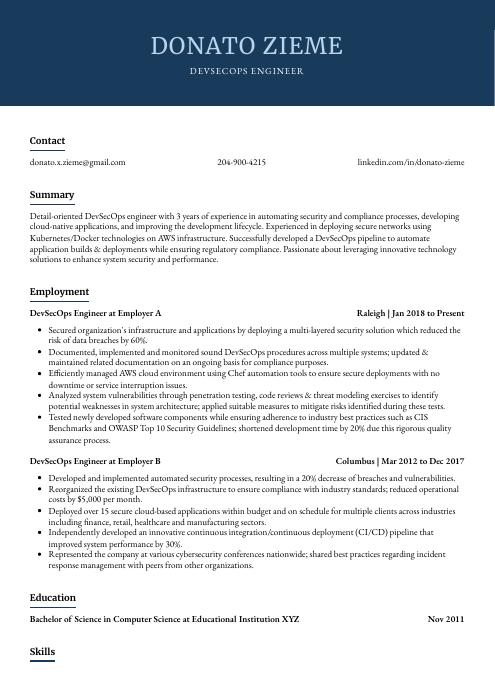 Bonobo
Bonobo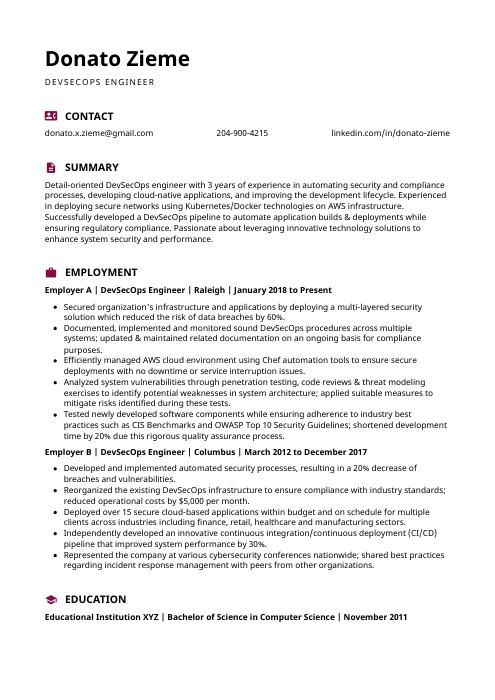 Hoopoe
Hoopoe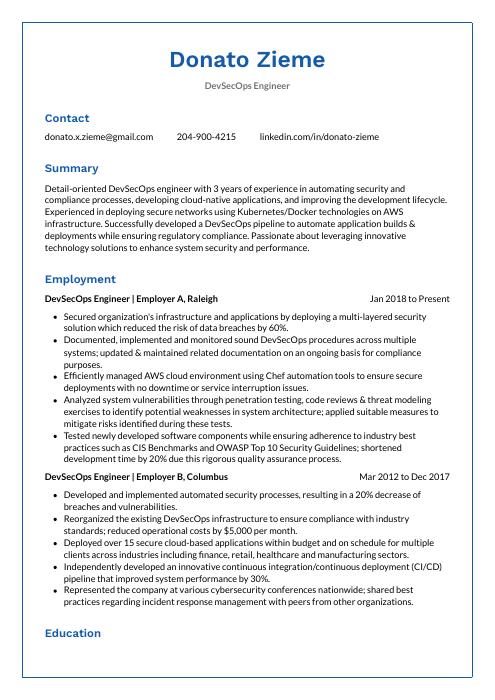 Markhor
Markhor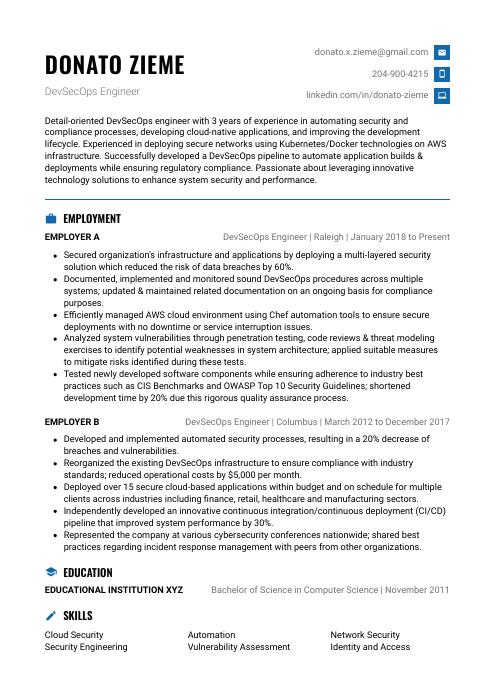 Echidna
Echidna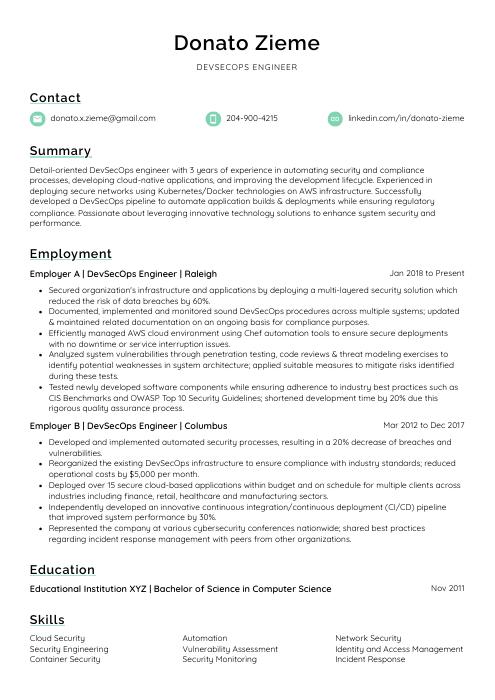 Lorikeet
Lorikeet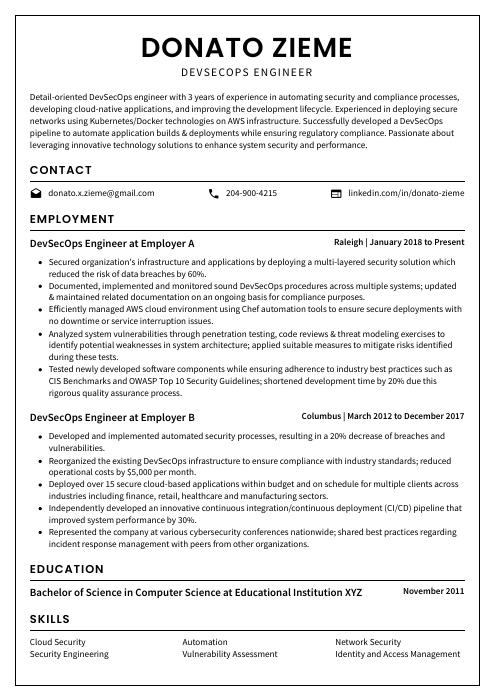 Cormorant
Cormorant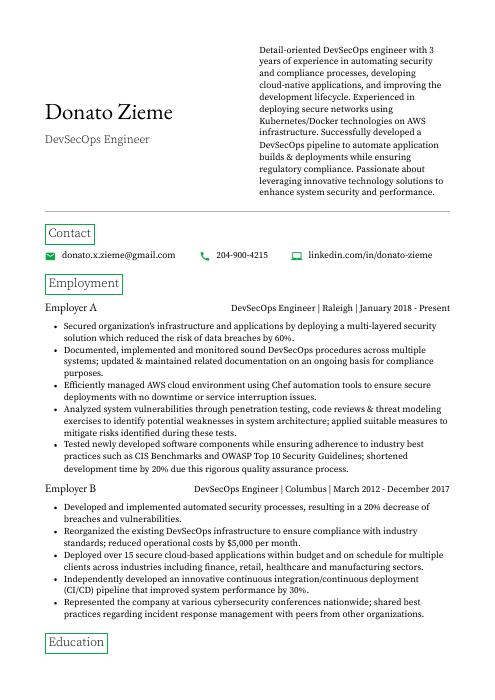 Quokka
Quokka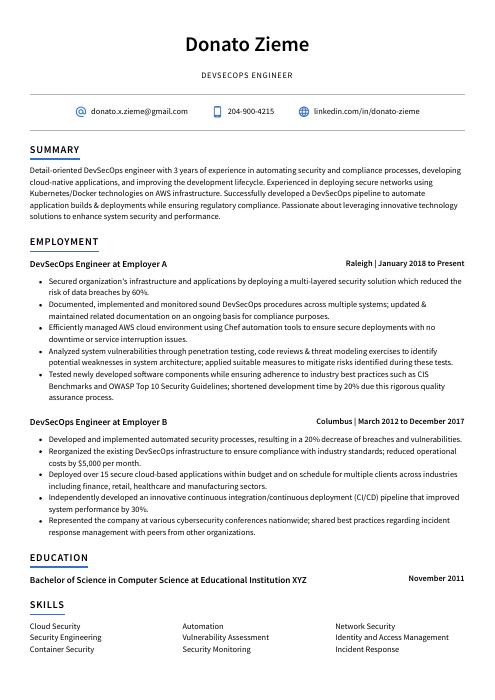 Axolotl
Axolotl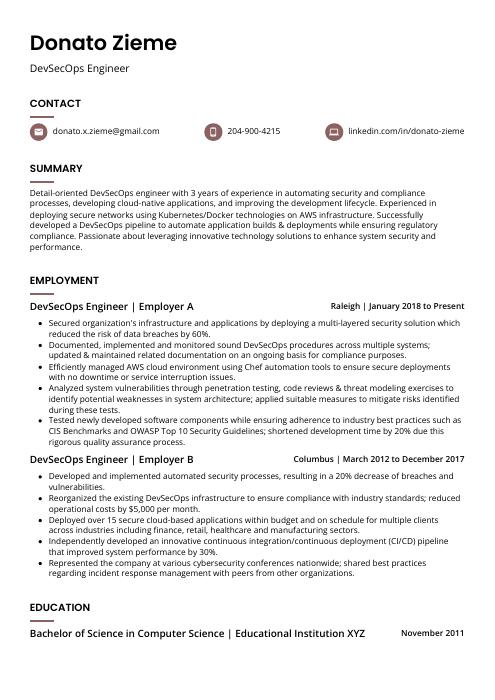 Fossa
Fossa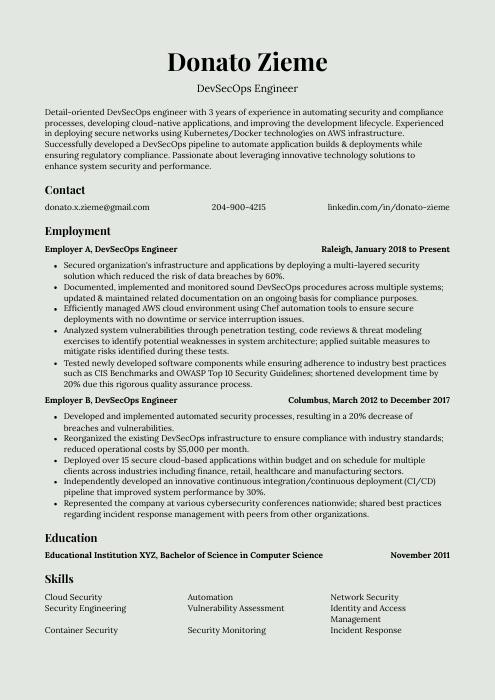 Saola
Saola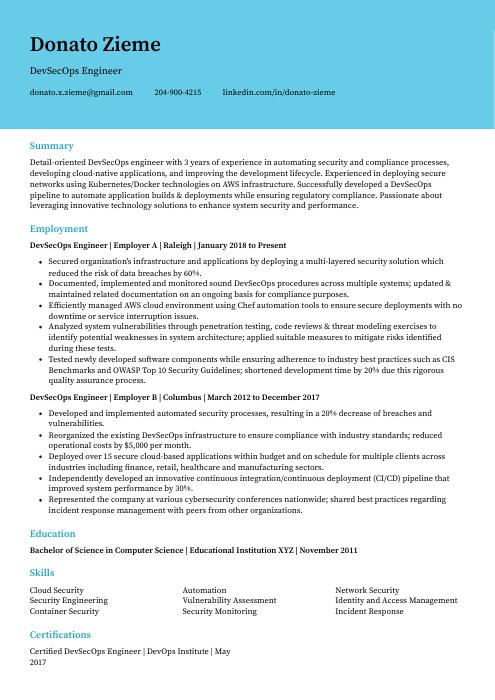 Dugong
Dugong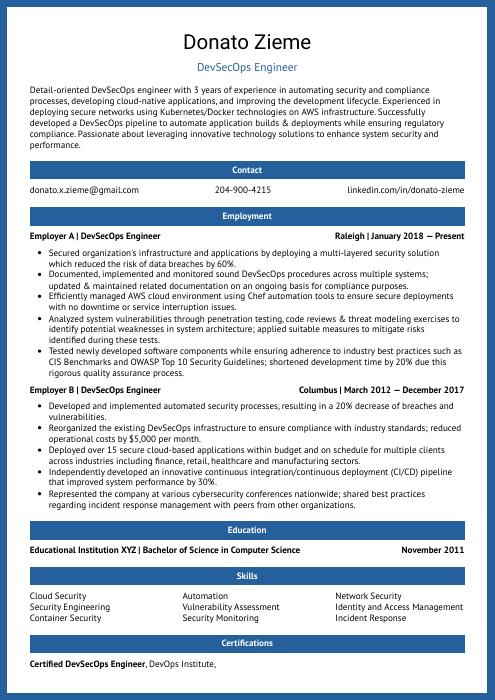 Ocelot
Ocelot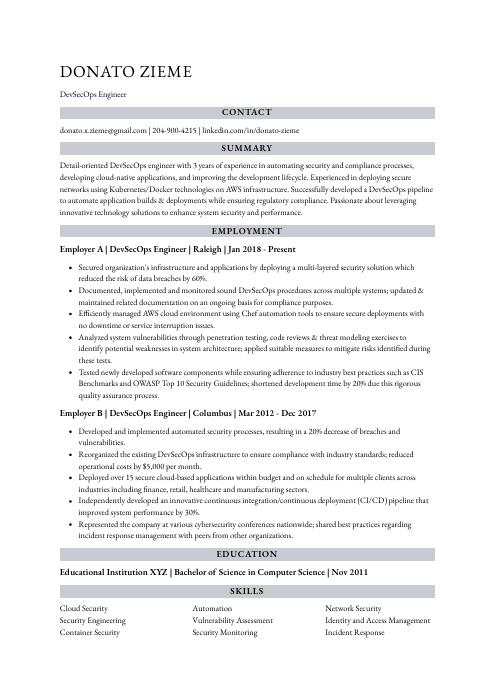 Numbat
Numbat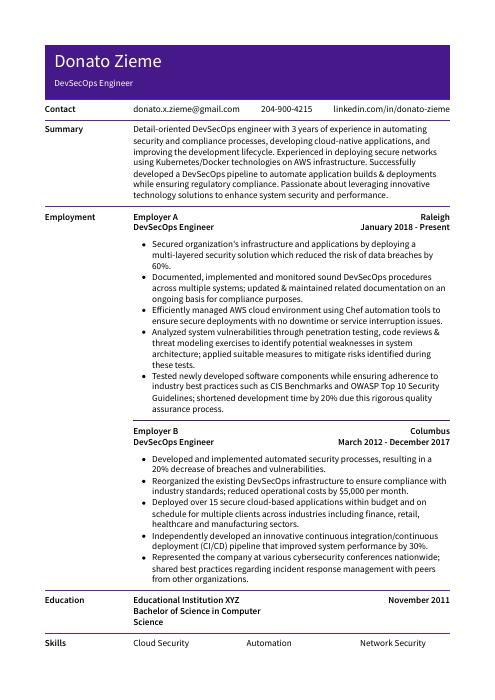 Pika
Pika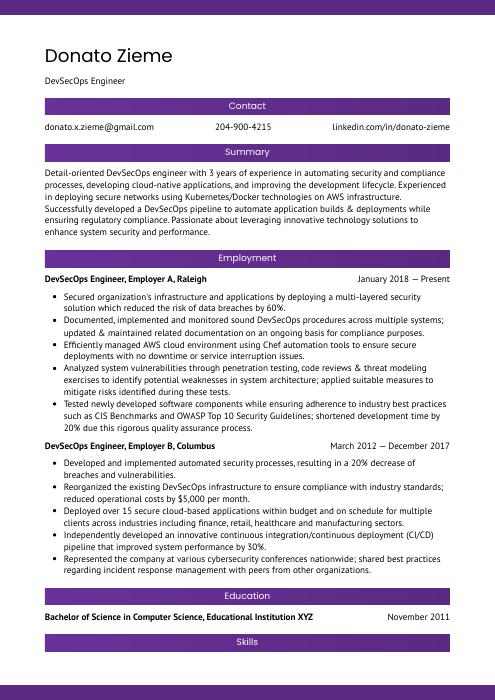 Jerboa
Jerboa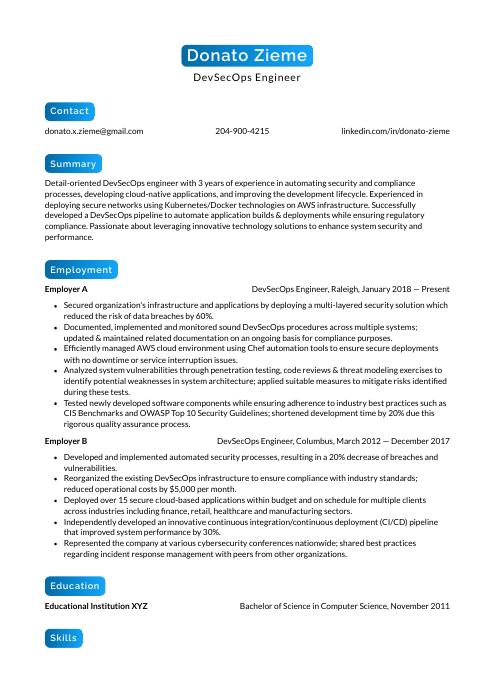 Kinkajou
Kinkajou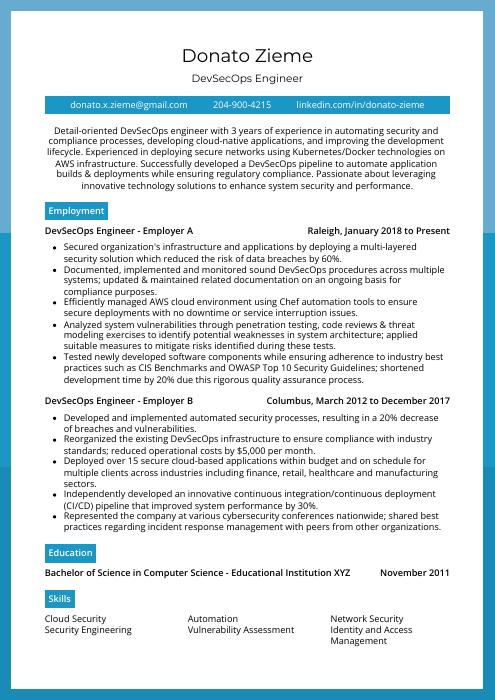 Rhea
Rhea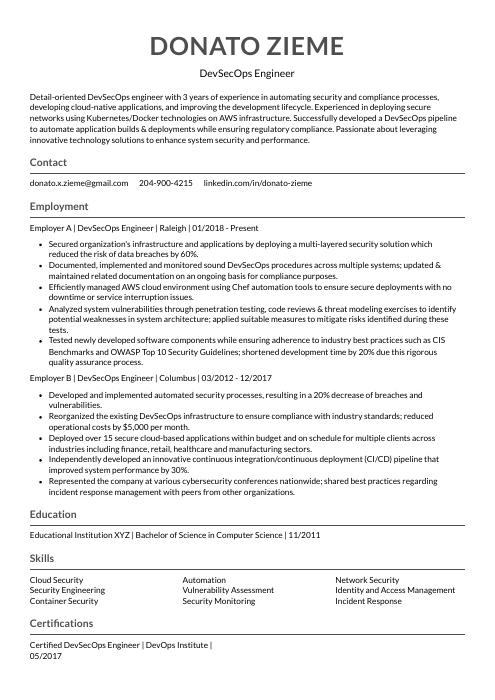 Indri
Indri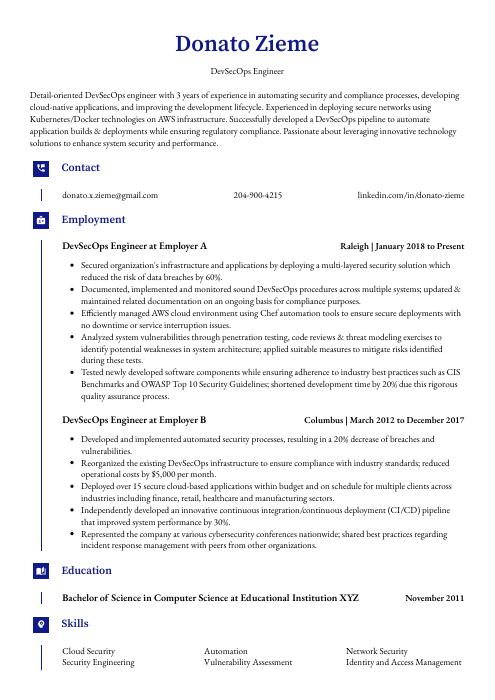 Gharial
Gharial Rezjumei
Rezjumei
